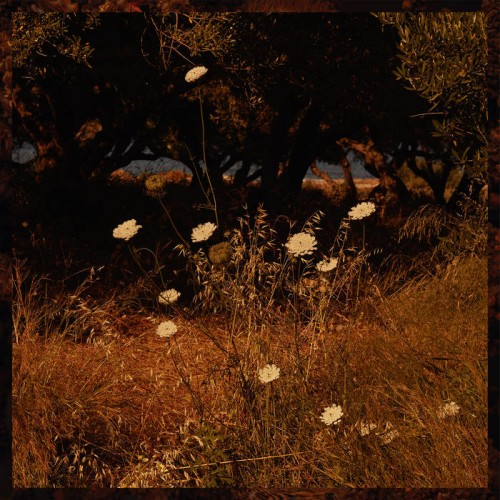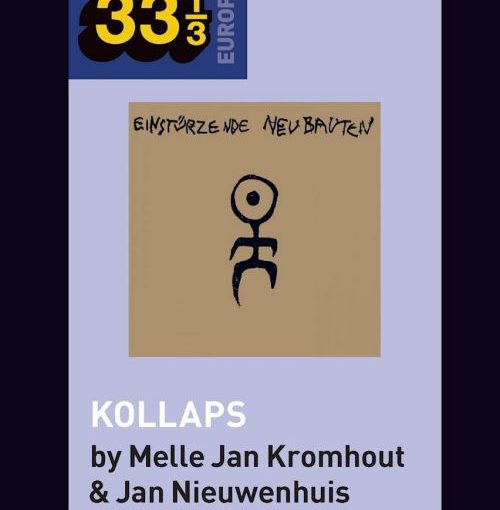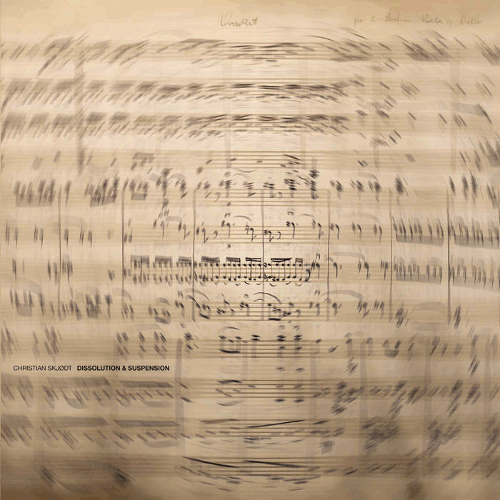The Underworld, London
10 and 12 February 2008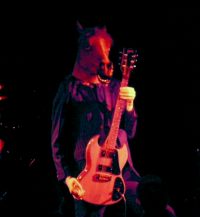
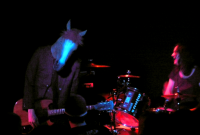 The day after a chunk of Camden Market burnt down, Southern Lord‘s finest black metal act touch down in The Underworld. Thankfully the conflagration was at the other end of the High Street, so the gig continued as scheduled with the only hint that something had occurred being the line of police officers across the road by the tube station.
The day after a chunk of Camden Market burnt down, Southern Lord‘s finest black metal act touch down in The Underworld. Thankfully the conflagration was at the other end of the High Street, so the gig continued as scheduled with the only hint that something had occurred being the line of police officers across the road by the tube station.
Support act Naked Shit are notable not only for their terrible name, which at least sparks debate as to whether it’s a nude turd or an excretion performed in the altogether, but for the presence of a horse as the bass player. OK, so it’s really a man in a suit with a horse head on, but it looks great – even with the trailing locks under the neck which does make it seem like the mane becomes a mullet. As gimmicks go it certainly works, so there’s a sizable audience for their two-drummer and one bass sludgefest. To be fair, the horse-man would have difficulty playing much more than the sub-doom rumble on his guitar with the restrictions imposed by his mask, but the simple bassline and twin drum action don’t have quite the body and detail required to keep the half hour or so they rumble on interesting. “Horseshit!”, someone in the crowd shouts predictably enough at the end. “Shergar!”, calls another, more obliquely.
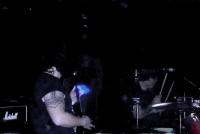
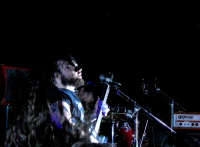 Wolves In The Throne Room, on the other hand, have both an excellently evocative name and the ability to overpower with the sheer brutality of their sound. Playing to a blacked-out room lit only by a few candles and little blue LEDs on the horns of their guitars, WITTR start with feedback, add in some more for good measure and build into an intense throb only made all the more demonic by the unearthly howling shrieks which Nathan Weaver utters at strategic points in the performance. The downside with the gig is that, compared to the variety and depth of their albums – particularly the recent Two Hunters – the monolithic live set is something of a disappointment by comparison, let down slightly by somewhat murky sound.
Wolves In The Throne Room, on the other hand, have both an excellently evocative name and the ability to overpower with the sheer brutality of their sound. Playing to a blacked-out room lit only by a few candles and little blue LEDs on the horns of their guitars, WITTR start with feedback, add in some more for good measure and build into an intense throb only made all the more demonic by the unearthly howling shrieks which Nathan Weaver utters at strategic points in the performance. The downside with the gig is that, compared to the variety and depth of their albums – particularly the recent Two Hunters – the monolithic live set is something of a disappointment by comparison, let down slightly by somewhat murky sound.
Where the records work in a dynamic loud-quiet-loud format, tonight’s set sticks mostly to loud-loud-loud with drone interludes, and perhaps for the full weight of the punishment meted out to fully satisfy requires the more reflective sections. However, it is still one of the most metal events to have descended like a never-ending thundercrack, even for somewhere as drenched in the storm and sweat of extreme rock and roll as The Underworld. WITTR leave ears pounding and bodies feeling battered by the sheer immensity – if not, surprisingly, volume – of the sound, particularly by a low end which sets clothes flapping under its pressure. It’s really only by imaginary comparison to what is perhaps wishful thinking as to what the impressively large sound the band have captured on record could have been like if it were being performed on stage tonight that this gig falls short: by all other standards, it’s a monster.
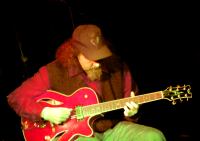
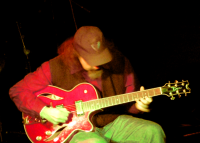 One knock-on effect of the fire damage is that Dingwall’s, located over the road from the heart of the blaze, could not put on the Earth and Sir Richard Bishop gig as planned for two days later. So instead the show relocates to The Underworld, making for a second night of Southern Lord-related heaviness in the venue.
One knock-on effect of the fire damage is that Dingwall’s, located over the road from the heart of the blaze, could not put on the Earth and Sir Richard Bishop gig as planned for two days later. So instead the show relocates to The Underworld, making for a second night of Southern Lord-related heaviness in the venue.
Sir Richard Bishop is guitarist with the long-travelling psychedelic jam band Sun City Girls.Tonight he’s showcasing his solo guitar work, having most recently demonstrated on the exquisite Polytheistic Fragments his deft ability to combine the free-flowing folk style of John Fahey with the blues, and eastern scales which occasionally take him into states of melodic elevation sharing more than a little affinity with the blissful swells of the later soundtrack works of Popol Vuh.
Tonight and every night it’s just him and his blood-red Les Paul semi-acoustic. A beatific, benign thrum fills the room, and no-one talks when Sir Richard Bishop starts playing; why would they want to? He starts to slowly rip up the dead quiet hush fallen on the venue with the power of his flamenco-dusted rhythms fluttering around the tawng of the electrically-amplified steel strings, turning out a crystal-clear shimmer which rambles into a mesmerising Nirvana. Nevertheless, there is a purpose to this music, one which is as timeless and hypnotic as the movements of the heavens – and if that sounds like hyperbole, then it’s also a set of jolly pleasant tunes to occupy space and time in the company of four hundred like-minded souls.
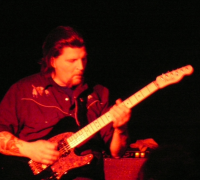
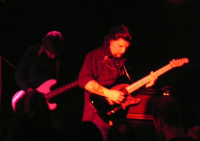 As with Sir Richard Bishop, Earth’s amplification is as much part of the sonic palette, their instrumentals sharing the same ability to slowly shred space and time with far more brightly-sparked energy than a dozen flashy hair metal geetar dudes spanking their planks at a hundred and twenty double-taps per second could ever hope to achieve. Both have a Zen abilty to shift and ride with the music, to drive a roomful of people up to float in hushed ecstacy through the simple combination of coiled steel, brushed drums and speaker cones turned up to just the right level of volume.
As with Sir Richard Bishop, Earth’s amplification is as much part of the sonic palette, their instrumentals sharing the same ability to slowly shred space and time with far more brightly-sparked energy than a dozen flashy hair metal geetar dudes spanking their planks at a hundred and twenty double-taps per second could ever hope to achieve. Both have a Zen abilty to shift and ride with the music, to drive a roomful of people up to float in hushed ecstacy through the simple combination of coiled steel, brushed drums and speaker cones turned up to just the right level of volume.
Their pace is sedate, as orbital as the name suggests, and the occasional trombone phrases and Wurlitzer drones from Steve Moore bring a perfect sense of melancholic flavour to the already thoughtfully-slow tunes. Dylan Carlson keeps up the countrified guitar end of the spectrum, while Don McGreevy‘s bass holds a thunderous low end down with poised frugality, a light touch on the strings shaking the foundations and reverberating chest cavities. Adrienne Davies hardly strikes her drums at more than a few tens of beats per minute, if that, but the punctuation is definite, precise, and guides the band with a light yet firm touch.
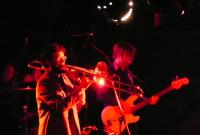
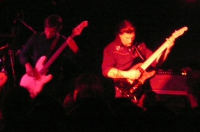 Together, Bishop and Earth represent a wide-open tradition of American guitar music which owes as much to the vastness of the country as their musical heritage elsewhere and a history which has been typically blended and evolved its own nuances and motifs – the environmental imagery which sweeps from tree-covered mountains to seemingly endless deserts is an obvious – yet potent – one, and even in a sweltering basement in old Europe, it’s impossible not to be caught up in the beguiling landscapes which they embody in their own very different ways.
Together, Bishop and Earth represent a wide-open tradition of American guitar music which owes as much to the vastness of the country as their musical heritage elsewhere and a history which has been typically blended and evolved its own nuances and motifs – the environmental imagery which sweeps from tree-covered mountains to seemingly endless deserts is an obvious – yet potent – one, and even in a sweltering basement in old Europe, it’s impossible not to be caught up in the beguiling landscapes which they embody in their own very different ways.
-Richard Fontenoy-

